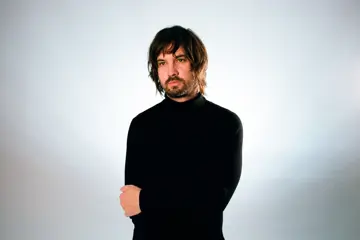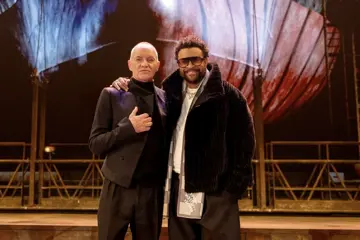 Surfer Blood
Surfer BloodTalk about pressure. Surfer Blood was hyped by the likes of Pitchfork before they'd even released their debut record. Just one song - their debut single, 2009's Swim – sent the band into hyperspace and Pitchfork put it at #37 on its list of top 100 songs of 2009.
The recording of their debut record was necessarily a pretty low key affair. “Recording by yourself in an apartment with no time constraints because no one's anticipating a record from a band that no-one really knows exists, you know?” says lead vocalist and guitarist John Paul Pitts, on the phone from North America where his band is on tour supporting Foals. They were in their early twenties then and released Astro Coast in January 2010 completely independently. Fast forward to 2013 and the pressure on the band, after waiting three years for new music (or two if you count 2011's Tarot Classics EP) is explosive. New album Pythons is set to diffuse it.
“We knew it was a highly anticipated record, you know? But I think the thing was to not let that get in our heads and fog that all up. So we made sure that we set ourselves apart. We were writing at home, in Florida, sort of out in the middle of nowhere with very little contact with the outside world. I think that helped us to really just let loose and have a nice economy of ideas flowing at all times without thinking about what it should sound like or what bands are coming out right now that have a certain sound, you know?”
He takes most pride in the notion that it is an “honest record” that aims to sit outside of trends. “A really earnest record and a really honest record in the sense that it's not trying to be anything or not trying to latch on to any bandwagon or anything. It's just a really emotional record, with personal lyrics and good melodies and that's kind of what we were going for, so I'm glad we didn't let anything get in the way of that.”
Don't miss a beat with our FREE daily newsletter
Pythons maintains the fuzzy surf vibe of Astro Coast, but with a little more polish and shine. Weezer is the closest reference point for the scuzzy, shout-pop lead single, Weird Shapes. The disarmingly bouncy second single, Demon Dance is actually about “dishonest and cruel people I've encountered” and was inspired by Sir Arthur Conan Doyle's The Hound Of The Baskervilles, says Pitts.
“I don't think that there's anything geeky about being well read, necessarily. I guess some of my favourite bands do it. I think it's cool to be self-referential in your songs. I mean, I'm not the most well-read person, personally. But I do appreciate someone who has a grasp on literature.”
Before spending all his time touring, Pitts used to like reading, but it's been months since he read a book cover to cover. There's no time to read when you're a rock star.
“I don't really feel like a rock star. But maybe I am because I don't have any hobbies. I've never signed any boobs – that's not really something I like to do – but it is really gratifying for people to come up and tell you what your music means to them and that kind of stuff. It's just when I hear the word rock star I think of Mötley Crüe, which is something that we consider ourselves pretty far removed from,” he says, drily.
Signing to major label Warner in September 2010 took Pitts one step closer to being a rock star. The youthful and naïve Surfer Blood didn't even know what it really meant to be signed at that point. “We were kind of confused about how the whole process worked,” says Pitts.
Pitts tells the story of how they navigated it. “We played hundreds and hundreds of shows for two years after our record came out and never really had the chance to have enough peace and quiet to get our ideas together. So when we came back we realised we had all these ideas that we'd never really discussed, but sort of doodled around with for a long time. So we spent three or four months at home writing and we were writing every day; just recording song after song and sending them over to our label. And we hadn't really heard anything and one day we got a call from someone on our label and they said, 'Hey, we're ready to let you guys record, come out to Los Angeles'. And that's it. It was like the shortest phone call we'd ever had with anyone, you know,” tells Pitts in his Florida drawl. “The next thing you know, we were on a plane with maybe 25 songs, meeting [producer] Gil Norton in person for the first time. And then we had eight weeks to actually record a record. So at that point it was kind of a whirlwind.” A headfuck indeed. “Yeah,” Pitts concurs. “It went from having no idea when we were going into the studio – we were just writing songs at that point – to literally being on a plane a week later. It was crazy.”
His ambitions up to that point had been pretty humble. “I always wanted to play in a band and I always wanted to make a living doing it. I wasn't really good at school or anything like that, so it seemed like this is what I always wanted to do, in spite of everything else I was always doing. And when it came to making a record with a producer in a studio, that's always something I'd dreamed of doing, you know? And just before, we've never really had access to it, really. So getting the chance to do that was a really great experience. I think next time we'd probably do a few things differently, but I really enjoyed the whole process of recording this record. I'm really proud of the way it turned out.”
Working with British producer Gil Norton (who has produced Pixies and Foo Fighters amongst many) on Pythons was the first time Pitts and the rest of the band – Thomas Fekete (guitar), Kevin Williams (bass) and Tyler Schwarz (drums) – had ever worked with a producer. Norton approached the band after they supported Pixies in North America, in “kind of really strange timing,” recalls Pitts. “We spent a few weeks of 2011 touring with the Pixies and we wrote a lot of the songs right when we came off that tour. And then next thing you know, Gil was interested in doing our record. So it's just kind of very really perfect the way it all worked out.”
Working with Norton was “amazing,” Pitt gushes. “The thing I like about Gil the most is he's willing to challenge us. I think he definitely pushed us to do things that either we don't think to do or that are out of our comfort zone. If you notice, the drummer, Tyler, is playing a lot more loose on all the songs and there's a lot more harmonies and back up parts. Stuff that we never actually took the time to do before he sort of pushed us to do.” They developed a trust in Norton after a couple of false starts. “A lot of the things he said, we thought sounded like they definitely wouldn't work. And more often than not they would, so I think after that happened once or twice, we were willing to try anything that he wanted. If we didn't like it, we knew that we could always say no, but he definitely wasn't afraid to get his hands all over it, you know? He was not afraid to tamper with the songs. And that was a really good thing we did in the end.”
Not only that, but Pixies have been one of Pitts' favourite bands since he was 15-years-old. “And we actually met them in an airport in New Zealand on the way to Splendour In The Grass, so it all comes full circle now.”
WORDS AND MUSIC
Surfer Blood's Demon Dance – inspired by Sir Arthur Conan Doyle's The Hound Of The Baskervilles – is the latest in a long line of musical associations with literature. Rock'n'roll and literature have been screwing around together since Jack Kerouac's love of jazz phrasing saw On The Road become the first rock'n'roll novel. Bob Dylan's absolutely soaked up Kerouac. On The Road Again, Desolation Row and Subterranean Homesick Blues respectively give nods to the Kerouac novels On The Road, Desolation Angels and The Subterraneans.
In the '60s, when literature was considered highbrow and rock'n'roll the primal scream of the gutter, Lou Reed's friend Tony Conrad found a copy of a book called The Velvet Underground on the street. The title of the S&M themed paperback by Michael Leigh became the name of Reed's band.
This century, Cold War Kids in particular are renowned for their literary prowess. The name of their second album, Loyalty To Loyalty, was taken from a paper by philosopher Josiah Royce, whose assertion to embrace your community was a response to a Nietzsche paper about individualism. Their current record, Dear Miss Lonelyhearts, is named after a slightly less lofty novel by Nathanael West.
Then there is the long list of bands named after books. The Doors were named for Aldous Huxley's The Doors Of Perception. Iron Maiden also referenced Huxley with their song Brave New World. Original bass player Tony Friel named The Fall after the novel by Albert Camus. Three years later The Cure released their debut single Killing An Arab, which was also based on a Camus novel, The Stranger. Heaven 17 and Moloko both took their names from Anthony Burgess' A Clockwork Orange. In the same fashion, but slightly less highbrow, Veruca Salt was named after a character in Roald Dahl's Charlie And The Chocolate Factory.















